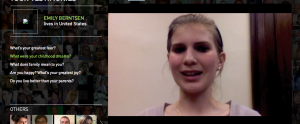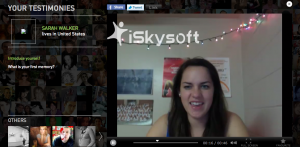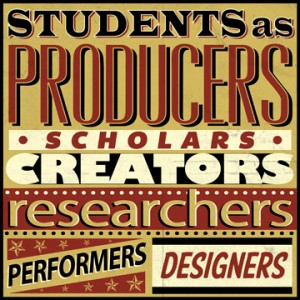Speaking into Humanity: French Students as Producers
by Nancy Chick, CFT Assistant Director
The CFT’s theme this year, “Students as Producers,” has given me the opportunity to talk with some talented and thoughtful colleagues across campus. On October 24, I brought together three of them to have a conversation on teaching about “Producing, Performing, & Creating Learning across the Humanities: Models of Generative Learning Assignments.” Their ideas were so rich that I’m devoting separate blog posts to each of them. Last time: Rory Dicker. Today: Nathalie Dieu-Porter.
Nathalie Dieu-Porter (Department of French and Italian) shared her French students’ projects in which they use their learning of language to develop intercultural awareness–and more. The assignment takes students from personal explorations of beliefs (their own and others’) to public performances on a site about what it means to be human. It’s grounded in an ambitious website designed as a “portrait of humanity” to “show everything that unites us, links us and differentiates us.” Called 7billionOthers.org, the site–easily searchable by topic and language–includes 6,000 interviews with people from 84 countries. Everyone answered the same questions about their “their fears, dreams, ordeals, hopes: What have you learnt from your parents? What do you want to pass on to your children? What difficult circumstances have you been through? What does love mean to you?” They also talk about death, identity, politics, happiness, God, war, work, discrimination–all through brief, personal video-narratives from people speaking a variety of languages.

Nathalie’s students read from the book of selected essays from the site, listen to the related testimonies from other French-speakers in various countries answering the same question, write their own essays about these questions, discuss them in class–and then record and share their own video testimonies on the 7billionOthers website. Of course, all of these steps are in French. In this way, their learning builds from reading, listening, writing, discussing, and finally to publicly performing units of meaning about topics significant to their individual lives and to their common humanity.

The most obvious way this activity positions “students as producers” is the making of a video for a real audience beyond the classroom, beyond the campus, and beyond a grade. However, in addition to the technical “production” of a public video, Nathalie is quick to point out that her students produce something more significant. The technical work of video production does not overshadow the learning goals of the course. The testimonies aren’t about lighting, camera work, or post-production; they are simply about articulating authentic expressions of self-in-culture, shared with fellow French speakers.
These videos document a moment in the students’ process of developing individual identities situated within a broader multinational context of French speakers with different origins, personalities, belief systems, and experiences. From understanding to expression, her students fully participate in one of the fundamental acts at the heart of the humanities: they explore and articulate the human condition (their own and others’) as constructed and performed through language.
—
For additional ideas on alternative projects for students in the humanities, check out the CFT guide “Beyond the Essay: Making Student Thinking Visible in the Humanities.”
The next post will feature Alice Randall’s students’ work.
The previous post featured Rory Dicker’s Women and Gender Studies Program’s students’ activism projects.


Leave a Response